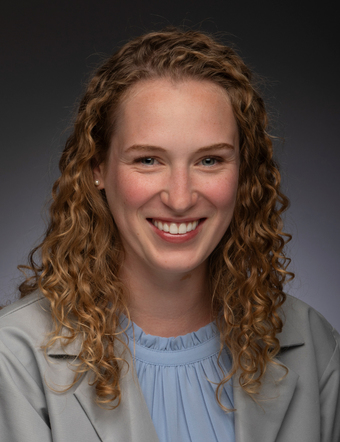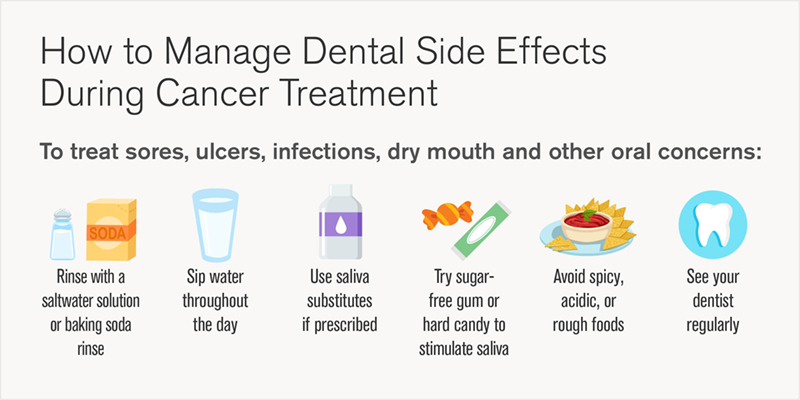Essential Dental Care for Cancer Patients: Protecting Oral Health During Treatment
November 27, 2024
Categories: cancer, Oral & Maxillofacial Surgery
Tags: Dentist, Oral & Maxillofacial Surgery, Dentistry, cancer pain
Dental health is important for everyone, but especially so for cancer patients. During cancer treatment, it's important to receive regular dental care to help prevent, find, and treat complications, such as tooth decay, mouth sores and infections.
"Cancer patients need to be a little more preventative and cautious than others because of the risks they face. They have to stay on top of coming to the dentist, brushing, and flossing, but there’s more at stake if they don’t keep up with that care," says Margaret Miller, DDS, a dentist at Loyola Medicine.
Why oral health is important for cancer patients
Cancer treatments can impact oral health in many ways. Patients who undergo chemotherapy and radiation therapy have a high risk of dental complications for a variety of reasons.
These therapies slow or stop the growth of new cells. While this is the main treatment for stopping cancer cells, it also effects the ability of oral tissue to repair itself. They may directly damage and break down oral tissue, salivary glands, and even bone.
Certain treatments may also upset the healthy balance of bacteria in the mouth. Your saliva is one of the ways in which your body maintains this balance. If the salivary glands become damaged from radiation therapy, it could lead to mouth sores, infections, and possibly tooth decay.
For all these reasons, cancer patients must prioritize a health regiment for oral care. A proactive approach before, during, and after treatment can save the patient years of dental complications.
"Radiation causes interruptions in blood flow, which affects the healing ability of the mouth, specifically in the bones and jaw. Patients are at an increased risk for bone death due to radiation, so we need to ensure there are no teeth that need to come out before treatment starts because we may not be able to fix certain dental issues after treatment begins" says Dr. Miller.
Dental care before cancer treatment
Patients should visit a dentist to correct or prevent any current and potential dental issues. Starting from a strong foundation will make your oral care easier once treatment begins. Any existing complications, such as cavities, gum disease, or impacted teeth, should be addressed as soon as possible. This appointment is also an opportunity to develop a personalized oral care plan that considers your specific treatment needs. Taking care of dental problems beforehand can make a big difference in managing your oral health throughout the process.
"I'm big on prevention for everybody. It’s especially important because the health of teeth before treatment is often indicative of how well patients are going to take care of them during and after. Good prevention beforehand leads to fewer problems down the road," says Dr. Miller.
Managing oral side effects during cancer treatment
Cancer treatments may cause different oral side effects. The following are common conditions that many cancer patients will face.
Mouth sores & mucositis
Mouth sores and mucositis can be painful and make it difficult to eat or talk. To manage them:
- Rinse your mouth regularly with a mild saltwater solution or baking soda rinse.
- Avoid spicy, acidic, or rough foods that can irritate sores.
- Use prescribed mouth rinses or gels recommended by your dentist or oncologist.
Dry mouth (xerostomia)
Dry mouth occurs when your salivary glands don’t produce enough saliva. It can lead to a sticky feeling in your mouth and an increased risk of cavities. To relieve dry mouth:
- Stay hydrated by sipping water throughout the day to keep your mouth moist.
- Use saliva substitutes or mouth moisturizers if recommended by your dentist.
- Chew sugar-free gum or suck on sugar-free candies to help stimulate saliva production.
"Dry mouth is a very common issue, and it can be from medications or radiation. We recommend patients carry a water bottle all the time to keep their mouth moist and use certain dry mouth products," says Dr. Miller.
Taste changes
Cancer treatments can change your sense of taste, making some foods taste metallic, bitter, or just different. To cope with this:
- Experiment with different foods to find what you can enjoy. Sometimes adding more seasoning or trying cooler, softer foods can help.
- Eat smaller, more frequent meals to manage taste changes and keep up your nutrition.
Oral hygiene routine
Maintaining a gentle but thorough oral hygiene routine is essential:
- Brush your teeth gently twice a day with a soft-bristled toothbrush.
- Floss daily, but be gentle around sensitive or sore areas.
- Use an alcohol-free mouthwash to avoid irritation and keep your mouth clean.
Post-Treatment Dental Care
After completing cancer treatment, it’s important to continue focusing on oral health. Some side effects may persist or develop even after treatment ends, so maintaining good dental care is essential for long-term well-being.
Schedule regular dental check-ups
Visit your dentist for regular check-ups every 3 to 6 months or as recommended by your doctor. These appointments allow your dentist to monitor any ongoing or new oral health issues that may arise after treatment.
Regular visits can help catch problems early, such as cavities, gum disease, or signs of oral infections that might not be apparent to you. Let your dentist know if you’re experiencing lingering side effects like dry mouth, sensitivity, or pain, so they can tailor care to your needs.
Continue a gentle, consistent oral hygiene routine
Keep brushing twice a day and flossing daily. Use a soft-bristled toothbrush and gentle technique to avoid irritating sensitive areas. Consider electric toothbrushes with soft modes if manual brushing feels uncomfortable.
Your dentist may recommend a fluoride toothpaste or mouth rinse to help strengthen your teeth, especially if you are experiencing dry mouth, which increases the risk of cavities. Continue to use alcohol-free mouthwashes to prevent further dryness or irritation.
Addressing tooth sensitivity
Some cancer treatments can cause increased tooth sensitivity, which may continue after treatment ends. The following tips can help you manage sensitivity:
- Desensitizing toothpaste: Use toothpaste designed for sensitive teeth to help reduce discomfort when eating or drinking hot, cold, or sweet foods.
- Avoid extreme temperatures: If sensitivity persists, try to avoid very hot or cold foods and beverages until your teeth feel less sensitive.
- Talk to your dentist: If over-the-counter options don’t help, ask your dentist about other treatments, such as fluoride varnishes or in-office desensitizing procedures.
Caring for your gums and soft tissues
Cancer treatment can sometimes lead to gum inflammation, sores, or other soft tissue concerns that need ongoing care. Continue to brush and floss gently to avoid irritating sensitive gums. If flossing is uncomfortable, try using dental picks or interdental brushes, which can be less abrasive on your gums.
Inform your dentist if you notice continued swelling, bleeding, or sores that don’t heal. These could be signs of a more serious condition, and early treatment is important.
Nutritional support for oral health
Maintaining a balanced diet rich in vitamins and minerals can help support your oral health after cancer treatment. Consider:
- Calcium and vitamin D: These nutrients are crucial for maintaining strong teeth and bones. Include dairy products, leafy greens, almonds, and fortified foods in your diet.
- Vitamin C: Foods high in vitamin C, such as citrus fruits, strawberries, and bell peppers, can help support healthy gums.
- Omega-3 fatty acids: Omega-3s have anti-inflammatory properties and can be found in foods like fish, flaxseeds, and walnuts. These may help reduce gum inflammation.
The Oral Health Center at Loyola Medicine
When managing your oral health during and after cancer treatment, you need a team that understands the unique challenges you face. The Oral Health Center at Loyola Medicine specializes in providing comprehensive dental care tailored to the needs of cancer patients. Our experienced team works closely with your oncologists to support your overall treatment plan, offering a truly integrated approach.
Collaboration with your healthcare team
Cancer treatments can have a significant impact on oral health, and our specialists understand how to manage and mitigate these effects. By coordinating with your oncologists, we can:
- Create a personalized care plan: Our dentists will work with your cancer care team to understand your specific treatment regimen and its impact on your oral health. This allows us to create a care plan that is tailored to your needs, helping to manage side effects like mouth sores, dry mouth, and sensitivity.
- Minimize treatment disruptions: By addressing oral health issues promptly and effectively, we aim to minimize any disruptions to your cancer treatment. For example, we can help manage infections or other complications that might otherwise delay your care.
- Monitor long-term effects: Even after your cancer treatment is complete, our team will continue to monitor your oral health. We’ll help manage any lingering side effects, ensuring that your mouth stays healthy and you remain comfortable.
"We work very closely with the oncologists. When they identify patients who will receive head or neck radiation, they immediately refer them to us. We communicate with them to determine the best treatment plan and how to address any future needs, ensuring patients stay healthy and well-nourished," says Dr. Miller.
Comprehensive oral care for every step of your journey
Loyola Medicine offers a full range of services designed to address the specific oral health needs of cancer patients.
Before you begin cancer treatment, our team will conduct a thorough dental evaluation to identify and address any existing oral health issues. This proactive approach helps reduce the risk of complications during and after treatment.
Whether you're dealing with dry mouth, mouth sores, or changes in taste, our specialists can provide guidance and solutions to help you manage these side effects. We understand that even small improvements in oral comfort can make a big difference.
Our commitment to your oral health doesn’t end when your cancer treatment does. We provide ongoing care to monitor your dental health and address any persistent issues, helping you maintain a healthy mouth long after treatment.
Margaret Miller, DDS, is a dentist at Loyola Medicine. She graduated from Marquette University School of Dentistry before starting her residency at Loyola University Medical Center. She treats patients at the Oral Health Center and collaborates with oncologists to help patients who are currently undergoing cancer treatment.
Book an appointment today to see Dr. Miller or another Loyola specialist by self-scheduling an in-person or virtual appointment using myLoyola.

 By
By 